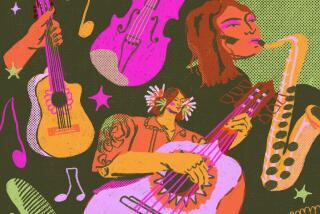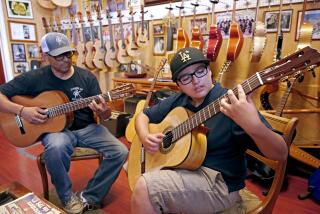History in every chord on a cigar box guitar
- Share via
MEMPHIS, TENN. -- — They’re built around wooden cigar boxes, just like untold thousands of homemade guitars patched together across America since the 1800s.
But no minstrel-show performer or sharecropper bluesman too poor for a store-bought guitar would know what to do with one of these.
They’re Lowebow-Hill Harps -- double-necked, electrified monsters with strings for both bass and guitar and hookups for paired amplifiers.
And they can wail.
“You can rock a house all by yourself with one of these things,” said “Microwave” Dave Gallaher, a blues guitarist and band leader from Huntsville, Ala. “Basically what you’ve got is two instruments in one.”
Lowebows (pronounced LOH-bohs) are built in the back room of a small Memphis guitar shop by John Lowe, a one-man-band street musician who’s making waves in a musical underworld where the cigar box guitar is king.
With “Microwave Dave & the Nukes,” Gallaher still relies primarily on conventional guitars. But he’s worked a Lowebow into the act, and “now, the first thing people say when I show up is, ‘Did you bring your cigar box?’ ”
Lowe designed the Hill Harp model in collaboration with Richard Johnston, a fellow street musician and Beale Street regular billed as “The Hill Country Troubadour.”
With a neck made of two oak dowels held together with hose clamps, the Hill Harp sports a single bass string on top with four guitar strings below. Separate magnetic pickups and output jacks in its cigar box body send the bass and guitar vibrations to different amplifiers, making for a clean, powerful sound.
“It is, no matter how you play it, a very primal instrument,” said Johnston, a specialist in the raw, juke-joint blues of northern Mississippi hill country.
“It’s perfect for hill country music because you can’t get fancy on it,” he said. “You’re going to hear one or two notes at a time and if you hear more than that, you’re going to hear a droning chord.”
Johnston won the Memphis Blues Foundation’s annual International Blues Challenge in 2001 with a Lowebow Hill Harp.
Lowe calls himself Johnny Lowebow when performing on the streets of blues havens like Memphis; Clarksdale, Miss.; or Helena, Ark.; or at cigar box guitar festivals. (Yes, there are such things.)
He’s been making several models of cigar box guitars for about seven years -- ranging from one- or two-string affairs called “Shorties” to the “Devil’s Lyre,” a souped-up Hill-Harp with a longer neck and a sliding metal scale adjuster.
The Shorties are named in honor of “Shake Hands With Shorty,” the debut album of the North Mississippi Allstars, a Grammy-nominated blues-rock band and one of the hottest acts in the Memphis region.
Lead guitarist Luther Dickinson often performs with a Lowebow Shorty, which the Allstars call a “Mississippi Pimpin’ Stick.” The band passed one along to Kid Rock, who recently showed it off on CNN’s “Larry King Live.”
Lowe said he’s sold 400 or more Lowebows, “mostly to blues guys who are kind of like famously obscure, you know.”
Lowebows don’t have frets so they’re generally played with slides. The Lyre model also has its own under-the-strings slide.
“It’s a variable scale and I can change it during a performance,” Lowe said. “I’m playing slides actually from both sides.”
The cigar boxes form plain rectangular bodies for most Lowebows. On the fancier ones, the boxes are surrounded by triangular frames or hand-carved wood in shapes like a standard guitar.
But they’re well within tradition for cigar box guitars. Traditionally they’ve been simple acoustic affairs, though many built today are electronically amplified.
When Lowe performs as Johnny Lowebow, he fingers the bass and guitar strings with his left hand, strumming with a drum stick in his right and hitting snares or cymbals on the down beat. He pounds bass drums with his feet -- and sings.
While Lowebows may be largely unheard of among mainstream musicians, their reputation is spreading in cigar box circles.
“Oh yeah, I’ve got one,” said Shane Speal of York, Pa., who runs two Internet sites for devotees of the cigar box guitar.
Lowe and Speal, who bills himself as “King of the Cigar Box Guitar,” were among performers last June at the “Cigar Box Extravaganza,” an annual music festival in Huntsville, Ala.
Speal reports more than 2,000 members for an Internet forum offering tips on making and playing cigar box guitars.
“There’s a growing thing now of one-man bands that’s making a comeback because of John Lowe and people like him,” Speal said.
Lowe sells his Shorties for $140 or so and the Hill Harps for about $500. He asks up to $1,000 for Lyres with particularly elaborate wooden frames.
The cigar boxes come from tobacco shops that are left with a surplus when customers buy their finer smokes a few at a time rather than by the box.
“They’re made out of Spanish cedar,” Lowe said. “It’s a way for them to turn their trash into profit.”
And making the most of trash is how cigar box guitars came about to begin with.
“They have that link to the past when people had to play what they could,” said Jay Sieleman, director of the Memphis Blues Foundation. “They couldn’t afford a guitar, so they made their own. You can still see guys down in Mississippi playing guitars made from gas cans or even ceiling fan housings.”
More to Read
The biggest entertainment stories
Get our big stories about Hollywood, film, television, music, arts, culture and more right in your inbox as soon as they publish.
You may occasionally receive promotional content from the Los Angeles Times.










